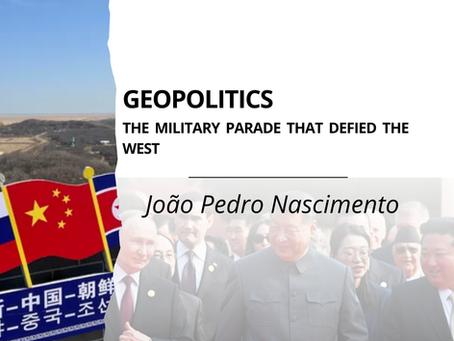top of page

Search


War Theocracy: the instrumentalization of faith in the Russian-Ukrainian conflict
The role of the Russian Orthodox Church (ROC) in the contemporary scenario transcends the domain of the sacred to become one of the most sophisticated pillars of Vladimir Putin’s geopolitics. To understand the depth of this phenomenon, it is necessary to dissect the symbiosis between the Patriarchate of Moscow and the Kremlin, which has transformed faith into a tool of territorial expansion and global cultural influence.
CERES
Jan 85 min read


United States and Venezuela: Another Example of a Geopolitical Dispute over Resources, Sovereignty, and International Influence
United States and Venezuela: Another Example of a Geopolitical Dispute over Resources, Sovereignty, and International Influence
CERES
Jan 75 min read


Geopolitics: an obstacle to advances in the energy transition
The mismatch between the idea of an energy transition and outdated infrastructure, unequal investment, and strong dependence on fossil fuels constitute major barriers to achieving a sustainable global energy system in the short term. Below, we highlight some of the key limitations to sustainability.
CERES
Nov 20, 20254 min read


The Military Parade that Defied the West
The Military Parade in Beijing should not be interpreted merely as a military demonstration, but as an act of strategic communication in the international arena. Xi Jinping used the event to reinforce three central messages:
(1) the historical legitimacy of China as a victor of World War II;
(2) the technological-military advances that place it in a position to rival the United States;
(3) the consolidation of a cooperation axis with countries challenging the liberal int
CERES
Nov 4, 20253 min read


Handpicked Victims: Silenced Genocides and the Hypocrisy of the Global Order
In today’s global landscape, human tragedies are often narrated selectively. Lives from “distant” countries are usually left out of media and political focus, as philosopher Judith Butler pointed out when reflecting on the unequal attribution of “grievability” to victims. Only those who fit the dominant framework—“Western,” Christian, or strategically useful lives—are presented as worthy of compassion, while other deaths remain silenced.
CERES
Jul 1, 20253 min read


Trump’s Attack on Iran and the Coloniality of the International System
On June 22, 2025, the United States, under the leadership of Donald Trump, launched direct attacks on three major Iranian nuclear facilities — Fordow, Natanz, and Isfahan. The American president described the offensive as a "spectacular success," claiming that the targets were “completely obliterated.” This action represents a critical escalation in the war between Israel and Iran, marking the direct entry of the U.S. into the conflict, and reignites deep questions about the
CERES
Jun 30, 20253 min read


USA and Iran: Nuclear Program, Oil, and the American Goal of Ending the Ayatollahs’ Regime
While rockets fall on Israel and Iran, we now see American bombs targeting the ayatollahs' regime. Meanwhile, Trump gives a speech of false conciliation, hoping the Iranian regime will completely surrender. That will not happen. For the leaders of Iran, Hamas, Israel, and the White House, war is both the beginning and the end of dialogue.
CERES
Jun 24, 20254 min read


When Force Comes Before Peace: The Price of Power in the Escalation Between the U.S., Israel, and Iran
By Júlia Saraiva
The United States’ attack on three nuclear facilities marks a turning point in contemporary international politics. This is not just an isolated episode but a move that exposes the progressive collapse of multilateral norms, the erosion of international law, and the dominance of power politics in the conduct of international relations.
CERES
Jun 23, 20256 min read


The Death of Pope Francis and His Legacy for Religious Diplomacy and Catholic Progressivism
With the recent passing of Pope Francis, the Catholic Church enters a historical turning point. As the leader of more than one billion faithful around the world, Francis marked his papacy with a notably progressive stance on issues that, for centuries, had been met with silence or denial by the ecclesiastical hierarchy. His death not only closes an era but also opens a period of uncertainty and internal disputes about the direction the Church will take
CERES
Apr 22, 20253 min read


A Little-Known Story: The Oriental Contribution to Western Development
The Oriental Contribution to Western Development
CERES
Jun 6, 20245 min read


Brazil - Africa: Relations for a Multipolar Future
The new multipolar order, or what is understood as the beginning of multipolarity, has as one of its characteristics new arrangements in...
CERES
Apr 30, 20244 min read
bottom of page
